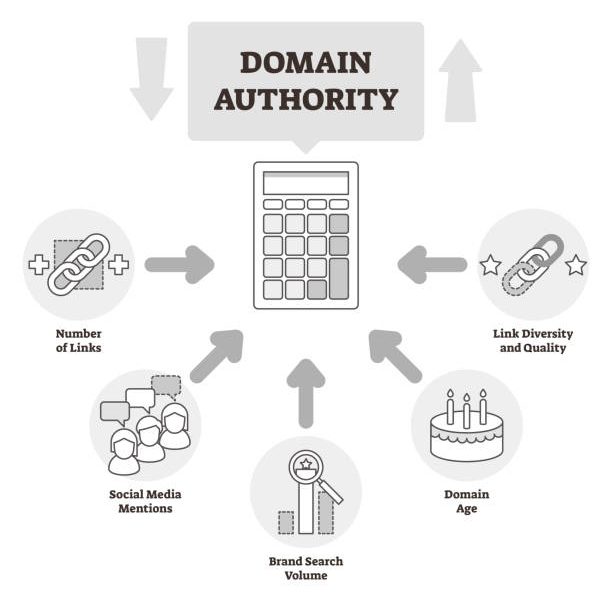When it comes to search engine optimization (SEO), there are many factors that influence a website’s rankings in search results. One such factor is domain authority, which is a measure of a website’s overall strength and authority in the eyes of search engines. In this article, we’ll take a deep dive into what domain authority is, why it’s important, and how you can increase your domain authority to improve your SEO efforts.
Before we dive in, let’s first define a few terms that we’ll be using throughout this article. First, we’ll be referring to what is domain authority.
Table of Contents
What is Domain Authority?
Domain authority is a score that ranges from 1 to 100, with higher scores indicating a greater ability to rank in search engine results pages. The score is calculated using multiple factors, including the number of high-quality external links pointing to the website, the quality and relevance of the content, the website’s age, and more.
The DA score is relative, meaning that it’s easier to increase your score from 20 to 30 than it is to increase it from 70 to 80. Therefore, it’s important to focus on incremental improvements rather than trying to jump from a low score to a high score overnight.
Why is Domain Authority Important?
Domain authority plays a crucial role in determining a website’s search engine rankings. Websites with high domain authority are more likely to appear at the top of search engine results pages, which can lead to more organic traffic, more leads, and more sales for the business.
In addition, a high domain authority score can help to build a website’s reputation and credibility on the web. When other websites link to your site, it’s a signal to search engines that your content is valuable and trustworthy, which can lead to even higher search engine rankings and more traffic.
How to Check Your Domain Authority
There are several free tools such as DA Checker by Make Vision Clear, Ahrefs, available that you can use to check your website’s domain authority. Just click on our website Make Vision Clear DA checker. Simply enter your website’s URL into the tool, and it will provide you with your website’s DA score, as well as other valuable metrics such as the number of inbound links and the top pages on your website.
When interpreting your DA score, it’s important to remember that it’s a relative metric. A score of 20 may be low for a large, established website, but high for a new website that’s just starting out. Therefore, it’s important to compare your website’s DA score to those of your competitors and similar websites in your industry. Read out this 15 B2B Digital Marketing Trends for 2023.
How to Increase Your Domain Authority
Now that we’ve covered the basics of domain authority, let’s dive into the step-by-step guide for increasing your website’s DA score.
- Build a Strong Link Profile
One of the most important factors that can contribute to a website’s domain authority is its link profile. In other words, the number and quality of external websites that link to your site.
To build a strong link profile, it’s important to focus on acquiring high-quality backlinks from relevant websites in your industry. This can be done through a variety of tactics, such as guest blogging, broken link building, and influencer
- Create High-Quality Content
In addition to building a strong link profile, it’s important to create high-quality content that provides real value to your target audience. This can include blog posts, infographics, videos, and other types of content that are informative, engaging, and shareable.
By creating high-quality content, you can attract more traffic to your website and increase the chances of other websites linking back to your content. This can help to establish your website as an authoritative source in your industry, which can lead to higher domain authority and search engine rankings.
- Optimize On-Page Elements
Optimizing your website’s on-page elements can also help to increase your domain authority. This includes optimizing your website’s title tags, meta descriptions, header tags, and other elements to ensure that they are relevant and keyword-rich.
By optimizing your on-page elements, you can improve your website’s relevance and authority for your target keywords, which can lead to higher search engine rankings and more organic traffic.
- Improve User Experience
User experience is becoming an increasingly important factor in search engine rankings and domain authority. If your website is slow to load, difficult to navigate, or doesn’t provide a good user experience, it can negatively impact your search engine rankings and domain authority.
To improve user experience, focus on making your website fast, easy to navigate, and visually appealing. This can include optimizing your website’s design, layout, and images, as well as using tools like caching and content delivery networks (CDNs) to improve website speed.
- Stay Active on Social Media
Social media can also play a role in improving your website’s domain authority. By sharing your content on social media and engaging with your audience, you can attract more traffic to your website and increase the chances of other websites linking back to your content.
To make the most of social media, focus on building a strong following on relevant social media platforms and sharing high-quality, shareable content that resonates with your audience. Read the future of social media marketing to drive growth.
How Long Does It Take To Build Domain Authority
Building domain authority is an important part of SEO (search engine optimization) and can take up to 9 months or even more to see improvement. Domain authority (DA) is a ranking metric that you can use to predict how well your website will rank on search engines. To increase domain authority, you need to establish backlinks and create valuable content.
According to Google, this process can take as long as six months to complete, so it’s important to be patient and understand that SEO is an investment that requires time and patience to build momentum. Checking your DA score is also essential in order to track progress and ensure that your website is performing well on search engines.
See also: 2023 SEO Trend Predictions.
Conclusion
Increasing your website’s domain authority is a crucial step in improving your search engine rankings and attracting more traffic to your website. By focusing on building a strong link profile, creating high-quality content, optimizing on-page elements, improving user experience, and staying active on social media, you can steadily increase your website’s domain authority over time. Remember, building domain authority is a long-term process that requires consistent effort and dedication, but the rewards are well worth it in terms of increased traffic, leads, and sales for your business.
What is a good Domain Authority score?
A good domain authority score varies depending on the industry and competition in your niche. Generally speaking, a score of 50 or higher is considered good, while a score of 60 or higher is considered excellent.
How long does it take to build a Domain Authority?
Building domain authority is a long-term process that requires consistent effort over time. It can take several months or even years to see significant improvements in your domain authority score, depending on the level of competition in your niche.
What organization is the top-level authority for supervising domain name requests?
The top-level authority for supervising domain name requests is the Internet Corporation for Assigned Names and Numbers (ICANN).



